From clueless to confident: my honest experience using AI Stylist to turn vague style questions into personalized outfit ideas, perfect for fashion non-experts.
by Yen VuSeptember 2025
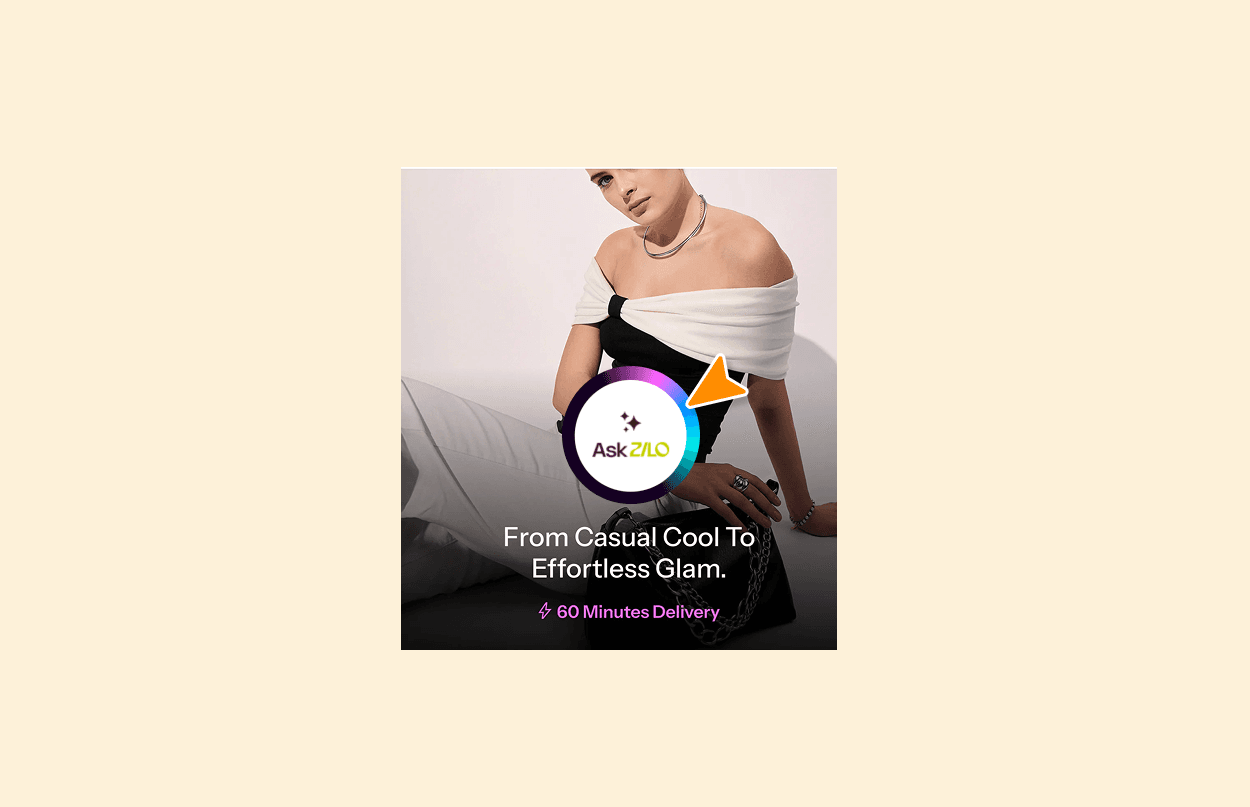
Hi, I’m a freelancer. I spend 90% of my time at home in pyjamas.
Fashion? Not exactly my strong suit.
But September is here. Autumn is knocking. And I have a fall photo shoot with my friends at the end of the month.
I don’t own anything “autumn,” or “trendy,” or even “presentable.” My wardrobe desperately needs a refresh.
I want at least one outfit that screams “autumn vibes.” I also need a couple of new looks that are polished enough for online meetings yet still comfortable enough for my home office life.
Here’s the thing, though: I’m in my thirties. I work in content marketing. And… I’m not fashion-savvy. My personal style leans toward minimalism and comfort. Think soft homewear, lazy shoes, and simple pieces I don’t have to think too hard about.
How does someone like me navigate the world of fashion trends without getting overwhelmed?
Table of Contents:
Like anyone facing a wardrobe crisis, I turned to the fashion apps already living on my phone. And I almost… cried.
The problem? I had absolutely no idea what was trendy. I didn't know which fashion buzzwords to type into the search bar. So, I simply typed what came to my mind. These are vague questions, such as “what’s in this season?” or “how do I incorporate current trends without spending too much?” The results?
The first app showed me… men’s fashion trends in autumn. Cool, but not what I asked. After scrolling down a bit further, I found some women’s looks buried deeper in the results. I felt a bit disappointed because the app couldn’t recognize my gender.
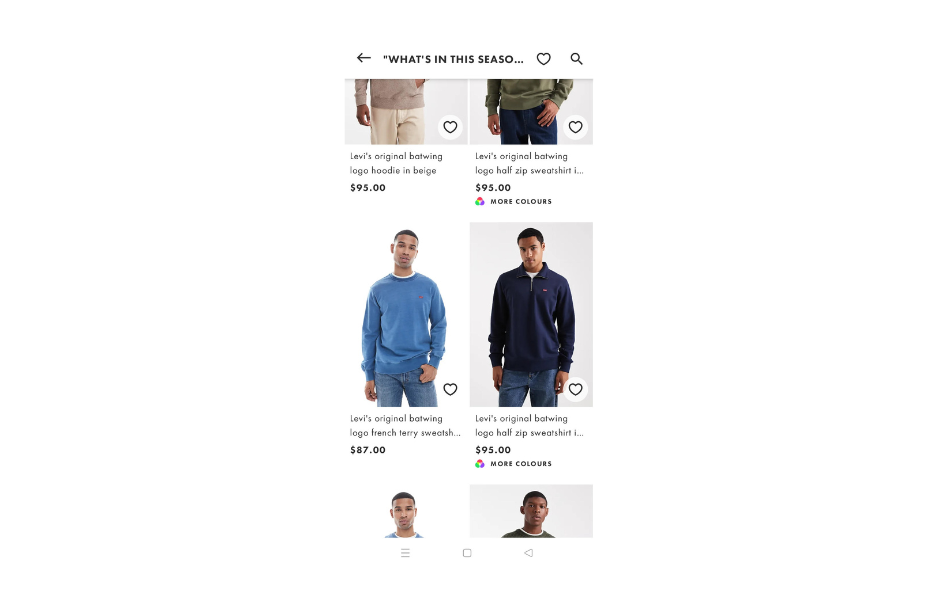 Disappointed but not defeated, I tried again with another search query.
Disappointed but not defeated, I tried again with another search query.
This time, the same app showed me nothing:
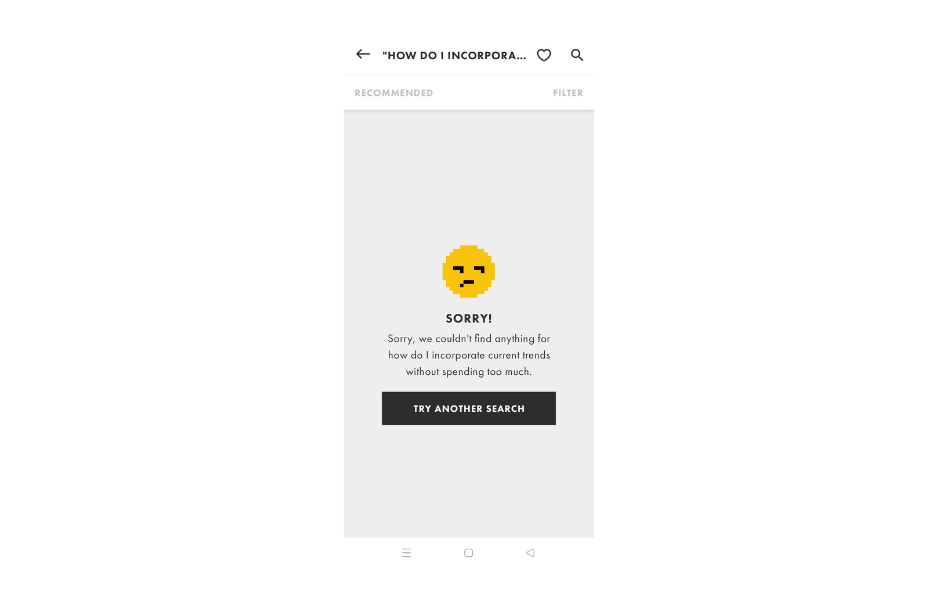 Okay, still no problem. There are many fashion apps on my phone. I just need to copy the same question into another app.
Okay, still no problem. There are many fashion apps on my phone. I just need to copy the same question into another app.
The second app returned some results. Yet, they were all aimed at teenagers. Thanks, but I was pretty sure these suggestions wouldn’t solve my autumn wardrobe crisis.
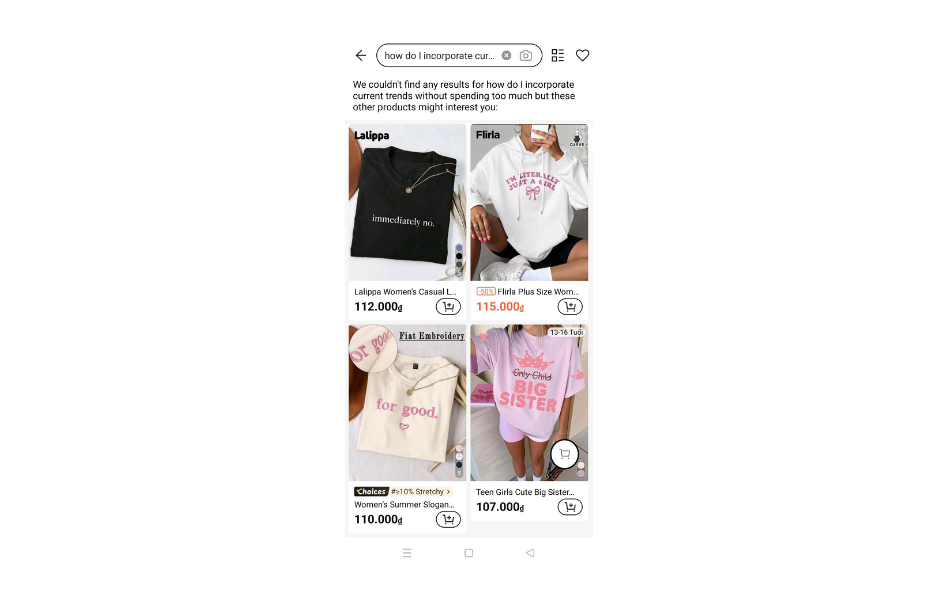 My First AI Styling Experience - Chatting Like with a Real Stylist
My First AI Styling Experience - Chatting Like with a Real Stylist After three failed searches, I had my lightbulb moment. We’re living in the AI era. Why not let an AI help me figure this out? Better yet, I know an online fashion store with a free AI-powered stylist. I can have a real conversation where I can explain my lifestyle, ask questions, and get personalized advice. It's similar to how we use ChatGPT.
I know Zilo, a fast-growing fashion eCommerce, has recently integrated the YesPlz AI Stylist. I decided to give it a try. Getting started was refreshingly simple. I opened the Zilo website on my mobile. It was hard to miss the AskZilo button at the bottom of the screen due to its friendly, inviting design.
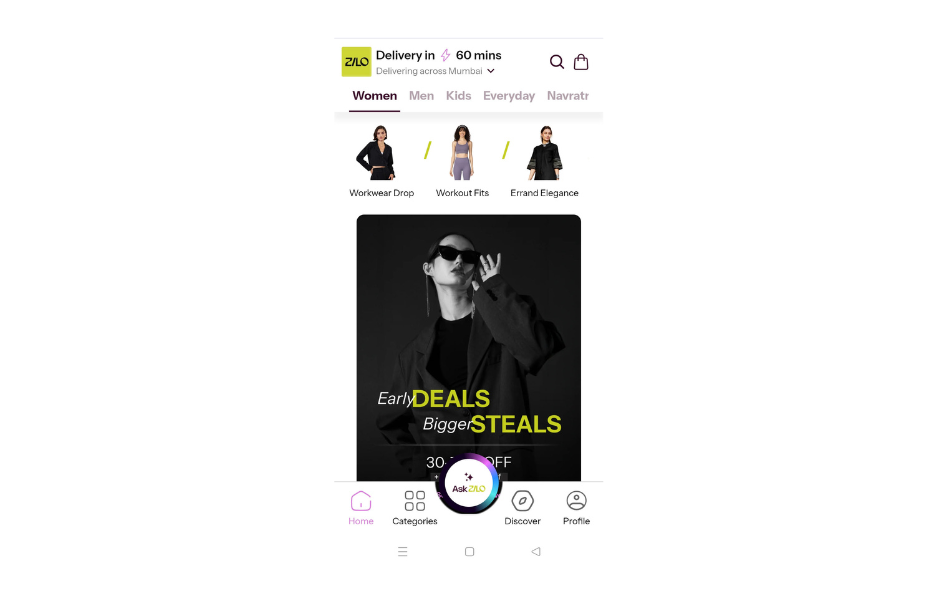 After selecting my gender, I was greeted with what looked like a chat interface.
After selecting my gender, I was greeted with what looked like a chat interface.
Instead of forcing me into rigid categories or making me guess the right keywords, the Zilo AI stylist offered two flexible options:
Input whatever question or keyword popped into my head into the search box
Or, choose one of the suggested prompts (with a Shuffle feature if I didn’t like the available options)
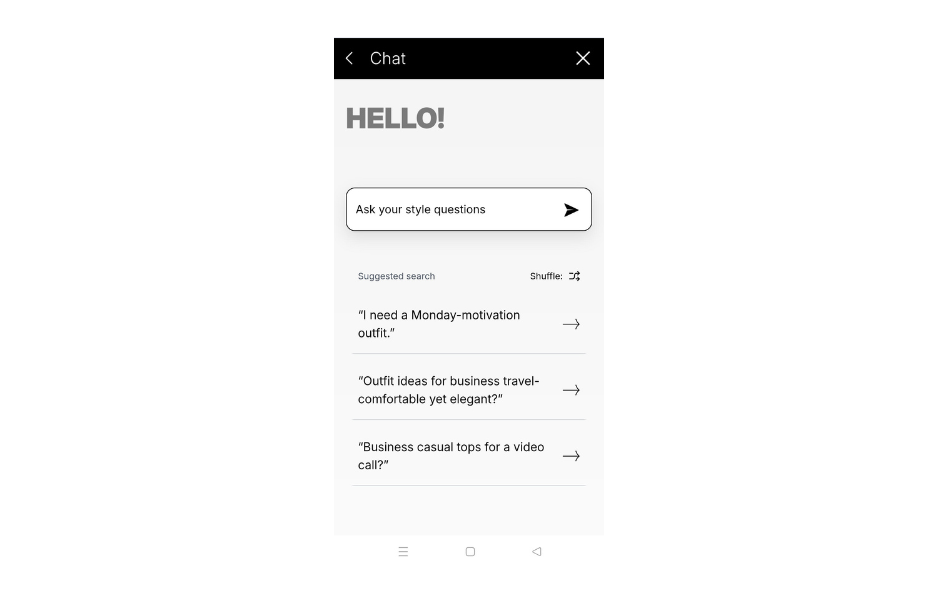 Prompt 1 - What’s in This Season?
Prompt 1 - What’s in This Season?Remember how this question failed on the first app?
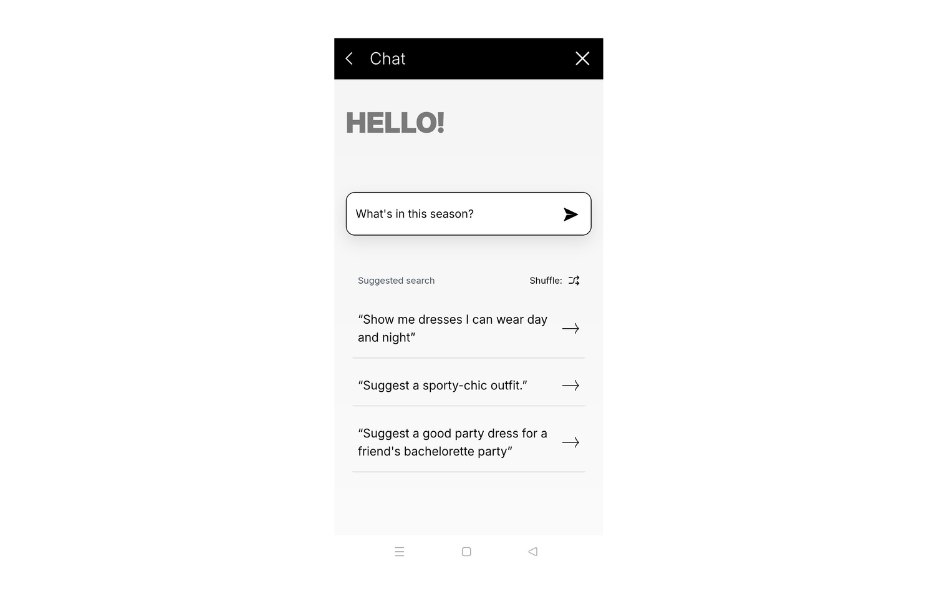 This time, it worked. Zilo AI stylist turned my vague question into an actual conversation.
This time, it worked. Zilo AI stylist turned my vague question into an actual conversation.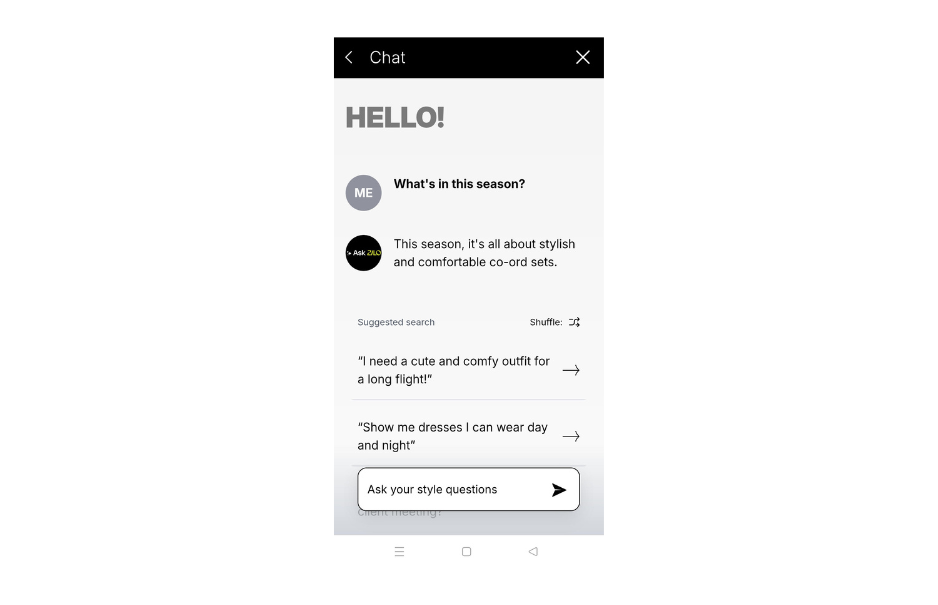 Co-ord sets would be a perfect choice for lazy and fashion-unconscious people like me. Buying them, I didn’t need to think hard about what to combine with what.
Co-ord sets would be a perfect choice for lazy and fashion-unconscious people like me. Buying them, I didn’t need to think hard about what to combine with what.
The conversation flow was so natural that I found myself asking follow-up questions without even thinking about it.
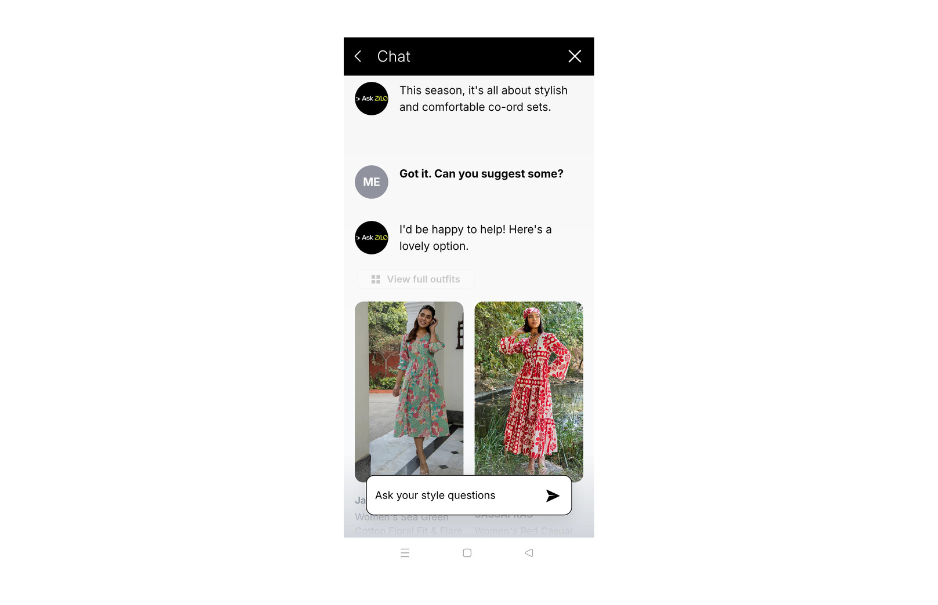 The AI stylist provided me with curated pieces of fall colors, textures, and vibes. The suggestions didn’t stop there when I clicked Show More.
The AI stylist provided me with curated pieces of fall colors, textures, and vibes. The suggestions didn’t stop there when I clicked Show More.
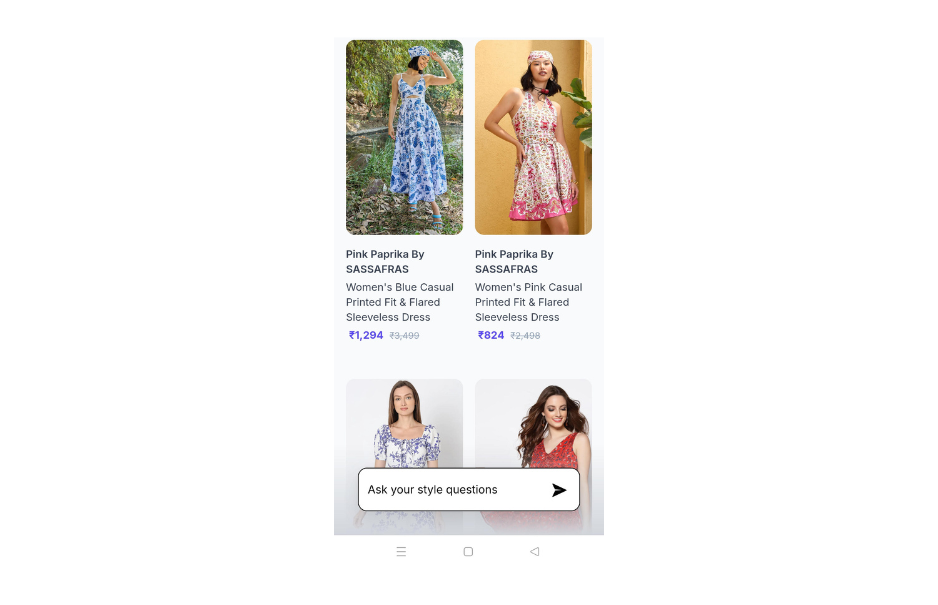 Among these dresses, two pieces caught my eye: the red one with long sleeves and the blue sleeveless. Both looked perfect for an autumn photo shoot. I couldn’t decide between them, so I added both to my cart. Then, I took screenshots and sent them to my friends to vote. The first mission was almost accomplished.
Among these dresses, two pieces caught my eye: the red one with long sleeves and the blue sleeveless. Both looked perfect for an autumn photo shoot. I couldn’t decide between them, so I added both to my cart. Then, I took screenshots and sent them to my friends to vote. The first mission was almost accomplished.
As I scrolled down, I saw the Suggested search section and a search box at the bottom. They were always available there, so I could ask more styling questions whenever I had one. I entered the second question that had left me stranded on the first app.
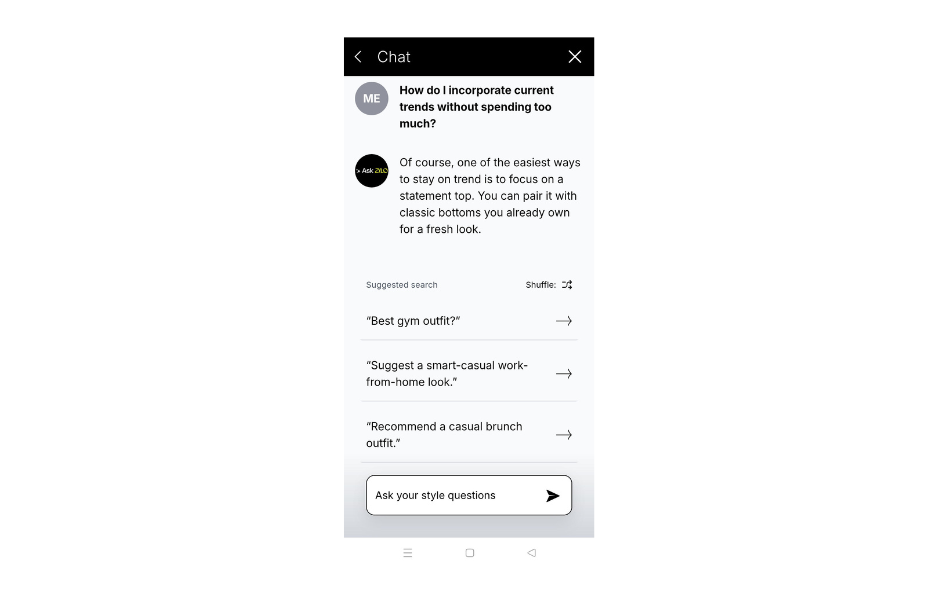 This time, it became a productive chat here. The AI stylist understood my search intent for trendy items without breaking the bank. It gave me clear, budget-friendly tips. I really liked this honest and well-intentioned answer. Combining pants in my wardrobe with a statement top was really budget-saving advice. But, what is a statement top?
This time, it became a productive chat here. The AI stylist understood my search intent for trendy items without breaking the bank. It gave me clear, budget-friendly tips. I really liked this honest and well-intentioned answer. Combining pants in my wardrobe with a statement top was really budget-saving advice. But, what is a statement top?
When the AI mentioned statement tops in its suggestions, I had to admit that I had no idea what this fashion item looked like. Is it a fashion buzzword this autumn?
Instead of feeling embarrassed about my fashion ignorance, I simply asked. The explanation was clear, educational, and accompanied by product examples. Perfect!
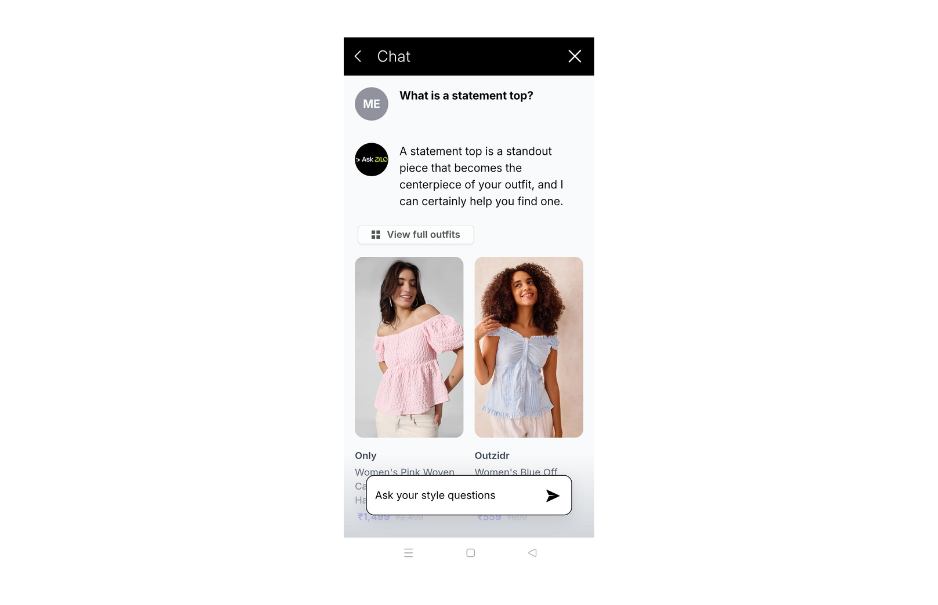 After seeing the examples, I realized statement tops weren’t really my thing. They didn’t align with my preference for simple, comfortable pieces. So I pivoted.
After seeing the examples, I realized statement tops weren’t really my thing. They didn’t align with my preference for simple, comfortable pieces. So I pivoted.
From the above AI responses, I realized that the AI stylist didn’t just answer like robots. It also didn’t try to convince me to buy products that didn’t fit my style, like some human salespeople.
It really understood my fashion intent and context and adjusted its recommendations accordingly. This was where I realized I wasn’t just using a search function. I was actually having a genuine personal stylist.
I started to put my trust in the AI stylist's answers. Thus, I decided to give it my real challenge. I typed exactly what was in my head:
Used conversational language: “Oh, I don’t like them.”
Made a grammatical error: “comfort” instead of “comfortable” or “comfy”
Gave unclear guidance: “Can you suggest some simple, comfort, young pieces for a freelancer like me?”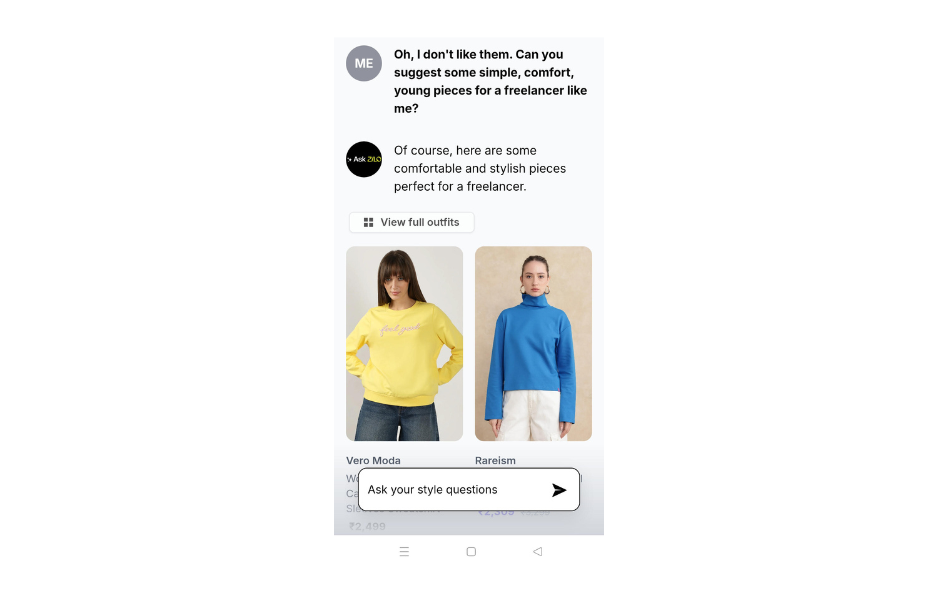 Not only did the AI understand my poorly constructed question. But it also perfectly showcased relevant products. Even better, I highly appreciated how it offered multiple ways of viewing the products. In the image above, you are looking at them separately. In this View separately mode, the AI stylist will surface various options for a single category.
Not only did the AI understand my poorly constructed question. But it also perfectly showcased relevant products. Even better, I highly appreciated how it offered multiple ways of viewing the products. In the image above, you are looking at them separately. In this View separately mode, the AI stylist will surface various options for a single category.
To see how different pieces worked together, I selected the View full outfits mode:
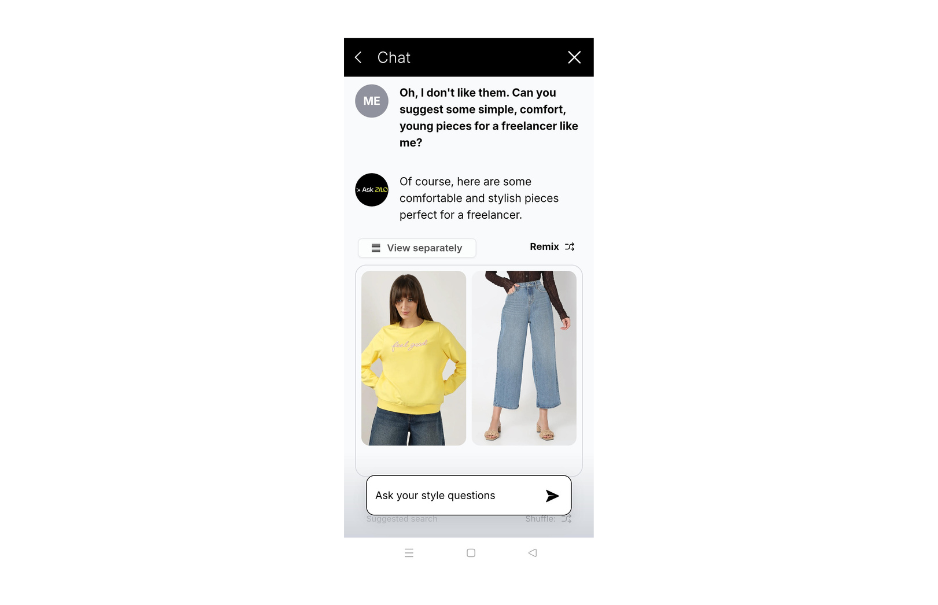 There was even the How about styling with these? section that offered creative mix-and-match ideas:
There was even the How about styling with these? section that offered creative mix-and-match ideas:
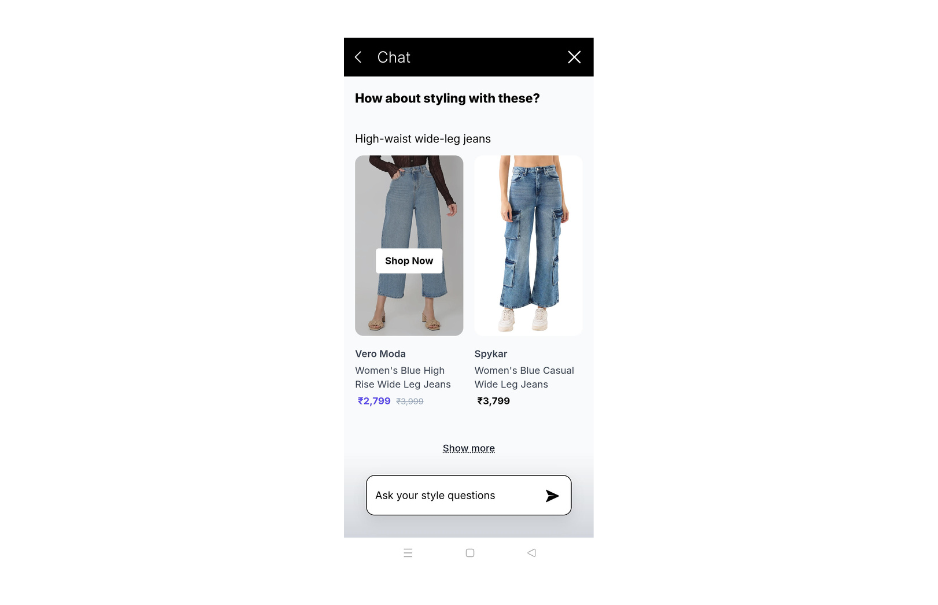 This flexibility helped me see individual pieces, understand how they worked as complete outfits, and get inspiration for creating my own combinations.
This flexibility helped me see individual pieces, understand how they worked as complete outfits, and get inspiration for creating my own combinations.
Among all the suggestions, one item in the How about styling with these? section caught my eye: the blue high-rise wide-leg jeans. It felt perfectly “me.” So, I clicked Shop Now to see more details. 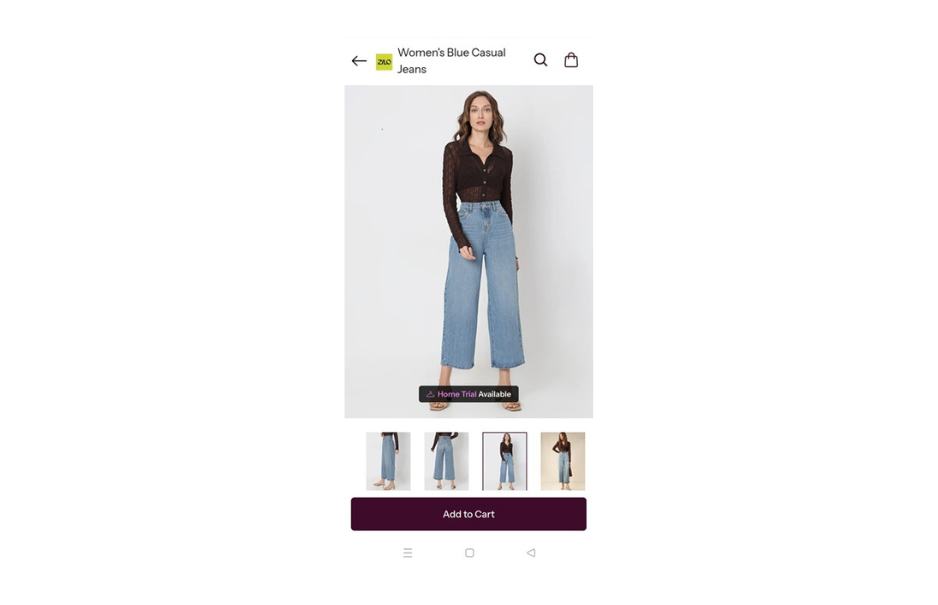 After visiting its product page and seeing model images, I decided to add the jeans to my cart. It followed exactly my fashion philosophy - simple, comfortable, but still put-together enough for online meetings. I also looked for a top to complete the look.
After visiting its product page and seeing model images, I decided to add the jeans to my cart. It followed exactly my fashion philosophy - simple, comfortable, but still put-together enough for online meetings. I also looked for a top to complete the look.
Zilo product pages really impressed me. Below the product images, three types of recommendations actually made sense:
Best Seller: Similar items that other shoppers actually bought (not just algorithmic guesses)
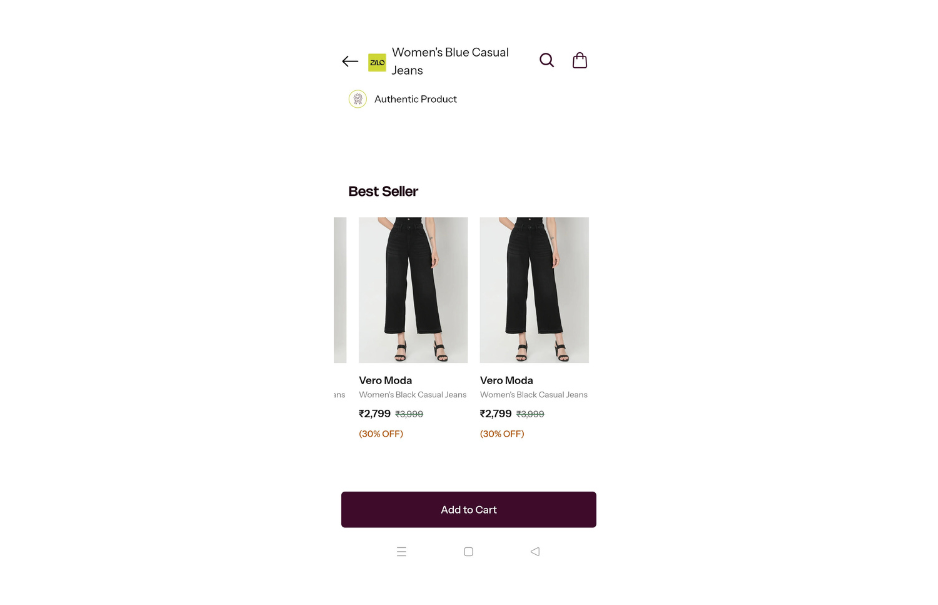
You May Also Like: AI-curated suggestions based on the specific product that is currently viewed.
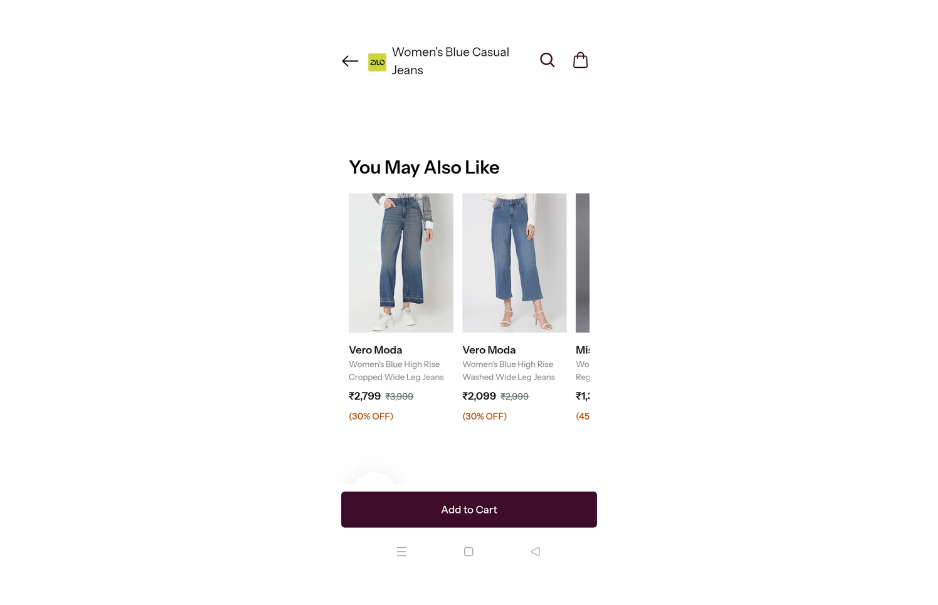
More from the Same Brand: Cohesive pieces from the same brand that would work well together.
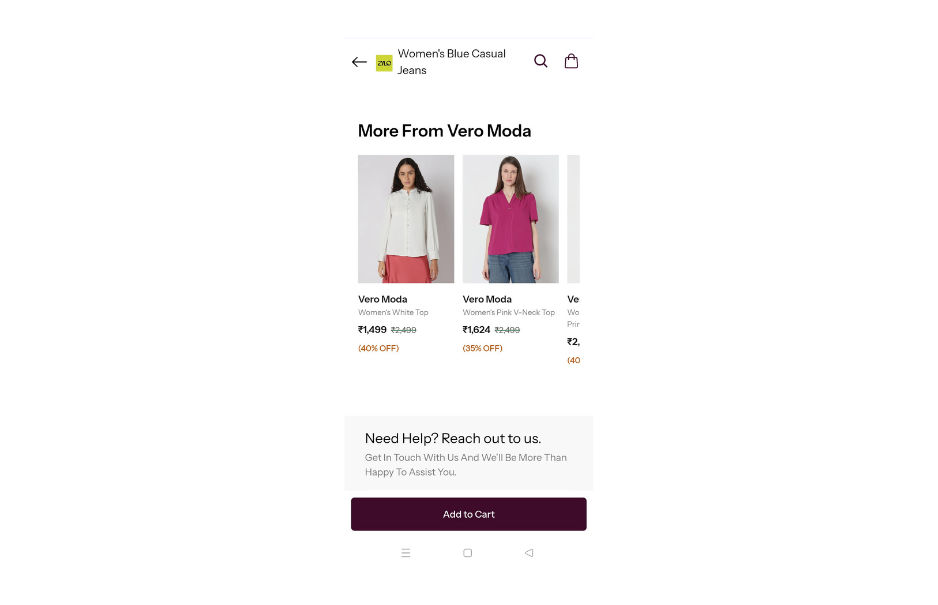 These recommendations led me to discover the perfect companion for the jeans: a pink V-neck top. It hit all my criteria: simple and comfortable. The complete outfit would look like this: I would wear the jeans and tuck in my top. The set would be neat. So, I could wear it in online meetings and feel confident, without sacrificing comfort. The final mission was also complete.
These recommendations led me to discover the perfect companion for the jeans: a pink V-neck top. It hit all my criteria: simple and comfortable. The complete outfit would look like this: I would wear the jeans and tuck in my top. The set would be neat. So, I could wear it in online meetings and feel confident, without sacrificing comfort. The final mission was also complete.
The AI stylist experience opened my eyes. Here’s what I've realized: traditional fashion apps are designed for shoppers who already know exactly what they want. These apps assume we know the right keyword to search for our desired items. It’s like shopping for an air fryer. We know the product name and can search directly.
But fashion items aren’t like electronic or home goods. Some people understand the fashion terms, know current trends, and can visualize how pieces work together. But what about the rest of us? What about busy professionals, parents juggling multiple responsibilities, or anyone who just wants to look put-together without becoming a fashion expert?
The AI stylist completely changed my perspective on what an online fashion store should be. Instead of making me work harder to find what I need, it worked with me. It met me exactly where I was confused and time-pressed. Let’s break down the specific problems traditional fashion apps encountered and how AI addresses them in the sections below:
Force users into broad categories that don't reflect real styling needs
Require existing fashion knowledge to be effective
Provide generic results that don't consider personal lifestyle or preferences
Make shoppers play the puzzle game of figuring out how pieces work together
Engage in actual conversations about style preferences and lifestyle needs
Easy to ask follow-up questions and refine suggestions
Educate shoppers about fashion terms and trends without being condescending
Adapt suggestions based on budget, comfort level, and personal style
Show multiple ways to view and combine pieces
Understand natural language, even when it's not perfectly articulated
The experience feels less like using a shopping app and more like having a patient, knowledgeable friend help us figure out our style.
The AI stylist completely changed how I think about online fashion shopping. Instead of feeling lost in a sea of options, I felt guided and understood. The conversational interface, personalized suggestions, and educational approach transformed what's usually a frustrating experience into something genuinely helpful.
For a fashion non-expert like me, this AI styling approach was exactly what I needed. I walked away with two complete outfits that I actually loved. I wish my favorite brands would adopt this level of personalization. Shopping for clothes shouldn’t feel like solving a complicated puzzle when many shoppers like me are already juggling work deadlines and life responsibilities.

Written by Yen Vu
I love crafting fresh, engaging content that connects with people while exploring new trends in fashion tech and eCommerce every day.
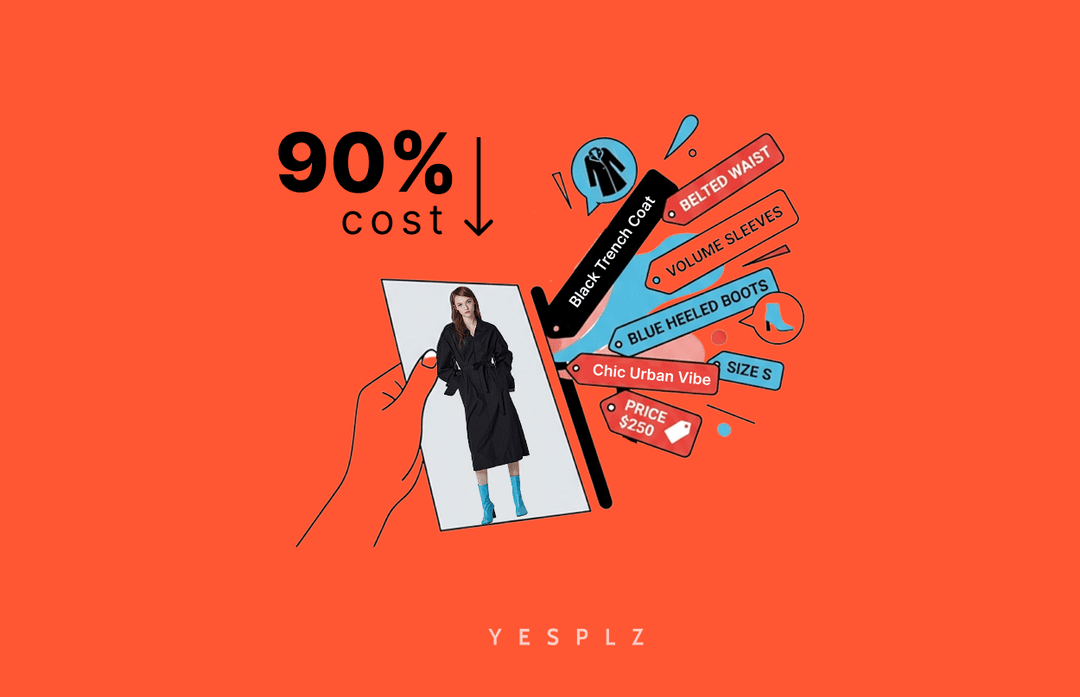
Inconsistent tags hurting sales? Self-service product tagging delivers accuracy and speed without enterprise prices. Tag products 10x faster at 90% lower cost.
by YesPlz.AI
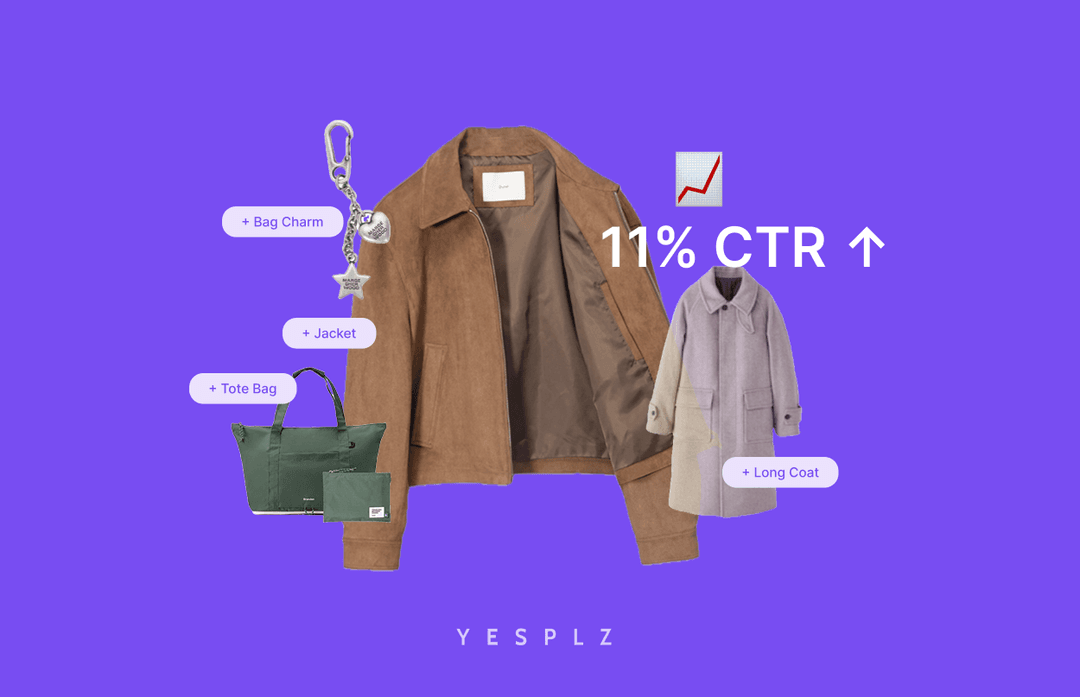
We analyzed 13,374 fashion searches. AI tagging increased product discovery by 22% and boosted clicks by 11%. Here’s what the data revealed.
by YesPlz.AI